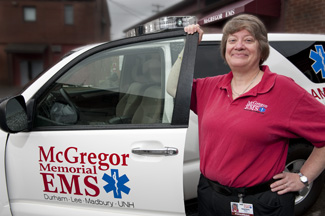 |
 |
| current issue |  | past issues |  | send a letter/news |  | address update |  | advertise |  | about us |  | alumni home |
Features
|
The First UROP Grant Recipients
Where are they now? |
Return to The First UROP Grant Recipients |
Karen Verny Henny '88
Major: biology
Job title: Kinesiology instructor, paramedic, McGregor Memorial EMS, UNH
Hometown: Barrington, N.H.
 Karen Verny Henny '88 |
What have you been doing since graduation, and what are you doing now?
After graduation, I continued on as a graduate student in the Zoology Department at UNH. During that time, I took an evening Emergency Medical Technician (EMT) course through the Kinesiology Department and began volunteering with the Durham Ambulance Corps (now McGregor Memorial EMS). I eventually went to the New Hampshire Technical Institute in Concord NH and received an A.S. in Emergency Medical Services in 1993. I became a New Hampshire EMS Instructor Coordinator in 1993 and began helping Ken Hult teach EMS classes in the Kinesiology Department. In 1996, I was hired on as faculty in Kinesiology, teaching CPR, EMT and First Responder courses. Currently, I am still teaching in Kinesiology and working as a paramedic with McGregor Memorial EMS, which provides EMS to Durham, Lee, Madbury and the UNH campus. I have a unique experience in that many of my UNH students become certified as EMTs and then volunteer with McGregor. So, I get to see them grow, not only as students but also doing the job for which they studied so diligently. So many educators never get to know if they made a difference with their students. I get to see how my students apply their knowledge. It's amazing when you see a former student actually take something you taught them in a classroom and use that skill out into real life and use it to make someone's worst day ever just a little better.
Your UROP project was entitled "Phototactic Responses During Settlement in Marine Fouling Communities." Can you tell us what you did, and what you got out of it?
I was studying the effects of light and color on invertebrate growth on hard substrates in the intertidal zone. One of the most interesting findings was that the local barnacle (Semibalanus balanoides) does not attach or grow on lighter surfaces. This was interesting because barnacle growth and removal adds huge expenses to the boating and shipping industries. Barnacle growth adds weight and drag, increasing full cost plus the antifouling paint used to prevent it is amazingly toxic. Barnacle removal is a costly and time consuming process.
Did your research have an impact on what you did later?
Even though my career path went from Marine Biology to Emergency Medical Services, the research opportunities I had through the UROP program were a huge plus. It taught me problem solving, critical thinking skills and scientific methods. All of these things help me to assess patients and develop treatment plans in a more thorough way. Applying critical thinking skills allow me to think about causes of a patient's symptoms, not just treating the obvious. I firmly believe everyone should be given opportunities to develop methods for investigating things that interest them. Helps to develop maturity and striving for a goal. It also has helped me as an educator. Rather than just teaching rote facts, I encourage my students to understand WHY they do things, not just WHAT to do. So many things are not "just like the book said" and if you can't think your way through a problem, you'll never solve it. Designing and implementing research projects help develop those skills and thought processes.
Anything else you'd like to add? Any advice for current students?
Make sure you take full advantage of all opportunities in your educational growth. Even if you ultimately wind up doing something completely different from what you studied, everything you do adds to your life knowledge. Ultimately, you will be a broader and more complete person if you absorb and learn from everything, even if it may not seem relevant at the time. Your experiences in life determine who you are, how you approach problems and, more importantly, how you solve problems. If your pathway is too narrow, you won't have the ability to deal with the broader world in which we all live.
< Previous recipient
Back to the '88 UROP stories
blog comments powered by Disqus

